A couple years ago, I wrote an impressions post for Total War: Rome II with a tentative review score of 5 out of 10. I never got around to writing a full review of the game because it remained in a near constant state of flux for over a year after its release. The developers kept adding new DLC ranging from modest culture packs to the tiny Blood & Gore pack. Last year, Creative Assembly released a massive DLC pack that also included across-the-board balance updates and expansion of some of the game's core features. This "Emperor Edition", and its attached Imperator Augustus campaign was free to everyone who bought the original Rome II, and so I decided to give it a try to see if it greatly improved the game.
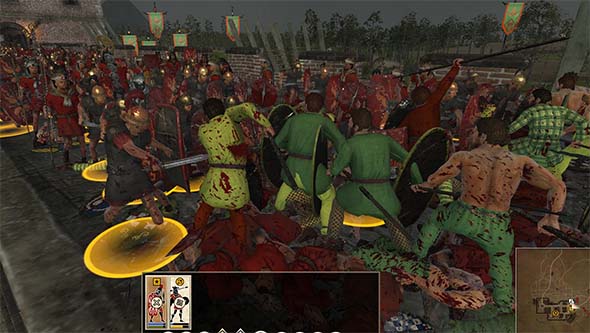
Blood & Gore costs a few dollars extra for those who want it, and increases the ESRB rating to Mature.
Core gameplay has subtle changes
Most of the changes to the core game are subtle, but they do add up to create a more enjoyable experience. The A.I. isn't nearly as bad as it originally was, and naval battles are actually playable now. Building effects have been completely rebalanced in order to avoid the problems with rampant squalor and lack of food that plagued the core game, and the politics systems have been changed to be more active and relevant to the game. Unfortunately, many of these changes are so sweeping, that they break existing campaign save games, meaning that if your version of Rome II was automatically updated, then you lost the ability to continue with any of your previous campaigns.
The most notable changes to empire management is that resources and building upgrades allow for much greater specialization of your various regions. This combined with the rebalancing of squalor and food means that there is incentive to actually upgrade your buildings past the first couple of levels. You also have some more meaningful decisions on what buildings you want to build and upgrade.
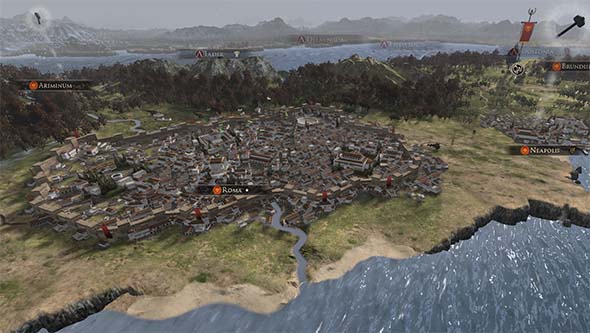
Squalor is no longer an intractable restriction towards building the glory of Rome.
Cities still physically grow on the map as the population grows and more buildings are constructed, and many of the high level buildings can add unique visual flairs to individual cities. It's also informative, since it's easy to see (at a glance) what infrastructure a city might have, which can help you manage your own empire, and can help you to assess the worth of a city for potential conquest.
A.I.s have also been designed to build higher-level settlements and to manage their armies better. Having higher-level buildings means that they have larger armies with more advanced units and better equipment. They provide a much greater challenge, as well as more tempting targets of conquest now. I haven't run into situations in which major factions (Carthage) dissolve into rebellions at the start of the game like I used to see in the base game.
Higher morale means battles last longer
Perhaps the best improvement that's been made by the post-release patches and the Emperor Edition is that the real-time battles are paced much better. Unit morale has been significantly tweaked so that units don't route and flee as soon as they make contact with a superior enemy force. Battles will generally take more than just a couple of minutes to complete, but they still aren't anywhere close to occupying the entire hour that the battle timer allows.
You'll actually have time to move some support units to help out an outnumbered defender before they flee, so there's also a lot more strategy involved in the individual battles. Reserve forces and cavalry flanking maneuvers have more relevance, and generals actually have time to reach front-line units in order to use their powers. You don't have to just clump all your units together in a single wall and ram them into your opponent anymore. You can even engage the enemy with a smaller force if you are stuck having to wait for reinforcements to arrive.
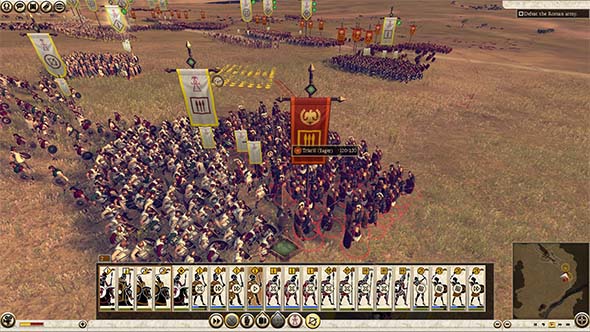
Tactical battles are slower, making cavalry and reserves more relevant, and allowing for more strategic thinking.
Speaking of cavalry, they are actually useful now, since units are generally more responsive to movement commands. In the initial launch version, I found cavalry to be useless because once they engaged an enemy unit, it was almost impossible to disengage without the whole unit getting routed or wiped out. Basically the only thing they were useful for was chasing down enemy skirmishers or flanking artillery. Now, I actually build and use cavalry because they are useful for hit-and-run attacks against regular melee infantry. You still want to keep them away from the pointy end of spears and pikes, but that's to be expected.
I still wish the battles were slowed down a little bit more, but the pacing is a lot better than it was at release. I still rarely see battles last more than 5 minutes of actual fighting, and I still routinely have to pause the game in order to issue orders because unit movement and combat happens so fast and so suddenly that I rarely have time to react in real-time. So even though summary screen may say that a battle lasted six minutes, I actually spent an additional fifteen or twenty minutes issuing orders while the game was paused.
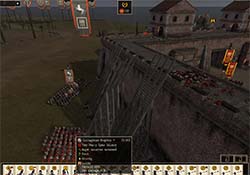
Bugs in which the A.I. never advances on city
walls are now the exception instead of the norm.
City sieges are another area that was abysmal at launch. It was almost impossible for the human player to ever lose a city because the A.I. would literally just stand outside of the walls and get shot down by the guard towers. Now, the A.I. armies are much more aggressive. When they come for your cities, they'll come in force, they'll have siege engines (ladders, at least), and they will attack your walls instead of just admiring them. Walled cities still require that you have a siege engine, since units still can't use grappling hooks. It's a little bit annoying, but it also means that protecting those siege engines is absolutely paramount.
The responsiveness of naval units has also been tweaked so that sea battles are actually playable now. Units don't regularly ignore my commands like they did when the game first launched. There are still nagging issues with ships regularly falling out of formation or having trouble pathfinding to specific places on the battlefield - which is weird considering that most battlefields are open water with no environmental obstructions. But these problems have been reduced to the point that I can play the sea battles and deal with them, instead of feeling compelled to auto-resolve every naval engagement.
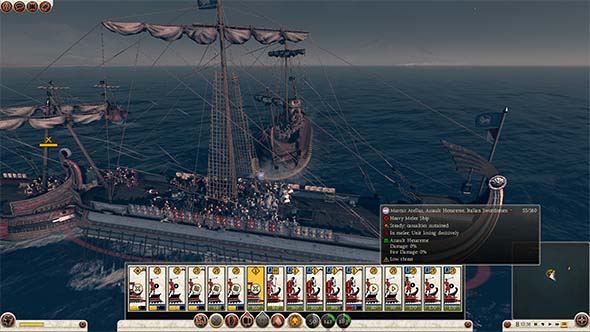
Sea battles are playable, but naval units are still sometimes unresponsive and plagued by nagging movement issues.
And if you still don't like the naval battles, then you'll be pleased to know that the auto-resolve is much more reasonable now. It no longer gives overwhelming advantages to the raw manpower available to embarked land armies. Instead, dedicated marine units are much stronger and are an easy match for transport galleys.
When it comes to the Grand Campaign, bigger is still not better
The biggest problem that I had with Rome II, however, was its scope. Creative Assembly apparently didn't learn their lessons from Empire. Rome II is just too big and covered too much area and time for its own good. Unfortunately, this didn't really change in the Emperor Edition. At least, not for the standard Grand Campaign.
I am very torn on the addition of seasons to the campaign. I loved the feature in Shogun 2 and complained that it was removed for the initial release of Rome II. The changing weather conditions of the various seasons in Shogun 2 offered strategic challenges. Advancing on a city during the spring may force you to siege the city during the rainy seasons, when flaming arrows and artillery are less useful, or entering enemy territory during the winter might lead to attrition in your army. These weather effects could make a difference in a close battle.
Well, seasons are back in Rome II, but I'm not very happy with how it works. A single turn in the campaign still takes up a whole year. The next turn will now progress to the following season of the following year. i.e. turn 1 will be the summer of 272 BC, and then turn 2 will advance to autumn of 271 BC, and so on.
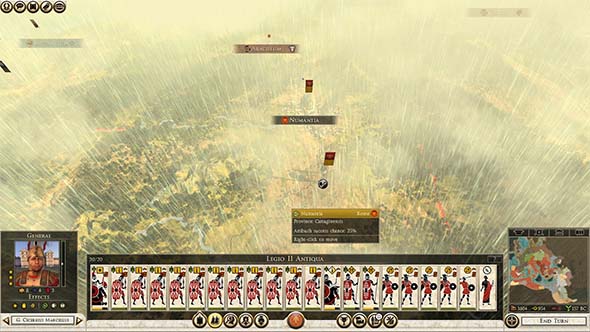
Turns now progress through seasons, which adds weather effects to the campaign and battles.
This just feels too fast for this style of gameplay and the feature set that's available. Having to spend any amount of time waiting to starve an enemy out of a city, or camping your general and his army in a city in order to replenish troops or quell unrest, always feels like a frustrating waste of time as you can watch the years literally tick away on the poor general's life. Generals and other characters have been patched to live longer before dying of natural causes (giving you a good 40 to 50 turns of use out of them, instead of less than 30), but I still feel like I'm racing against time to use them. Waiting for your units to replenish is also necessary since you can't combine depleted units like you could in earlier games. And now, having to sit behind your city walls and wait a whole extra year in order to avoid advancing through a territory that might cause winter attrition just exacerbates the issue!
Gods forbid that you ever find yourself in a period of peace in which your generals have absolutely nothing to do! At the very least, you can assign them to administer your cities, but this is a sad waste of their talents, and may require pulling them so far away from any possible theaters of war that they spend their whole life in transit without ever having a chance to do anything truly useful.
Bigger turns; less strategy
One of the core complaints with the design of Rome II has always been that units can only be attached to generals to form armies, and the number of generals is capped. This restricts the size of your overall army as well as restricting the total amount of territory that your armies can cover. In principle, it's not a bad idea. Cities provide their own (small) garrisons, and so the tedium of recruiting units to defend cities and maintain public order is abstracted. That's fine. I also don't have a problem with the core concept of having a limited number of large armies that need to be deployed across your empire to deal with threats like armed rebellions and sudden backstabs by former allies. It creates a sense of vulnerability that large empires didn't have in the previous games (as long as you could afford the upkeep of all your extraneous defensive units). So I'm also fine with that, conceptually.
The problems arise when it comes time to advance on the enemy. The first problem is with reconnaissance, or the lack thereof. Not being able to detach a small group of cavalry to scout ahead of your army means that you are completely dependent on spies and other agents to do your forward reconnaissance. It's not quite as bad as Civilization V was at release (which included no effective reconnaissance or espionage mechanics), but it's still extremely limiting in Rome II. The number of total agents available never seems to be enough for you to even keep one agent attached to each army - let alone your fleets. And some agents (particularly dignitaries) are best-suited for civil administration and are best left camped in your own territory performing passive administration. So knowing what's ahead of you and keeping tabs on enemy army movements is needlessly handicapped.
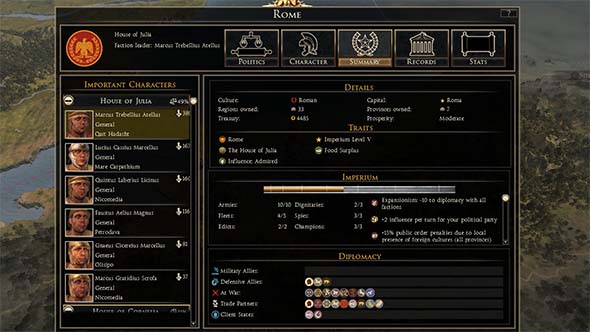
The number of total armies, fleets, and agents are all capped based on the size of your empire,
and there's never enough agents to meet my reconnaissance needs.
The second problem comes from the fact that you can't keep reinforcing armies without having to tie two (or more) generals together at the hip. You can't keep a reserve force of cavalry or artillery to back up your primary infantry and skirmishers without having them explicitly attached to their own general(s). This means that valuable siege equipment like catapults and ballistae must be put in harm's way whenever you engage the enemy - even if it's a field battle.
The corollary problem is that having to keep multiple generals on a single front cuts the number of active fronts that you can control. Even if you have the economic strength to maintain an additional army and open up another front of conquest, you're simply not allowed to. Because of this, and because of the annoying requirement of keeping your armies garrisoned in newly-conquered cities to restore public order, I often fell behind in the campaign and couldn't figure out what (if anything) I could have done differently to keep up with all my bonus objectives. For example, at the time in the campaign where I was supposed to be marching into Asia and the Middle East, I was still stuck trying to solidify my control of Spain and Central Europe. My economy was strong, I just couldn't build enough armies to go to all the places that I wanted and needed to go because I had to keep two or three generals together at all times in order to be a match for the enemy armies holed up in the capitals.
It's very convenient that all infrastructure management for a province was pulled into one panel. You don't have to click on a bunch of different objects on the map in order to build or upgrade your farms, mines, plantations, and so on. This makes it much easier to keep track of all the factors that are contributing to your economy, and you're much less likely to completely forget about some tiny mine stuck in between some mountains in the middle of nowhere. But this dramatic improvement to the game's accessibility came at an unfortunate cost: resources and infrastructure are all in the cities instead of in the countryside.
Since all building was pulled into the cities and the single province overview screen, all farms, mines, plantations, and so on have to be built within cities instead of out in the countryside. Because of this, the "raiding" command for armies has been abstracted, and you can't actively pillage, plunder, or sabotage enemy infrastructure or resources without assaulting the city itself. This does give some added value to spies and other agents, since you can use them to sabotage buildings within an enemy city (and this is the only way to accomplish such an action). But it also takes away a lot of the emphasis on open-field battles, since there is very little need or incentive to ever leave your own city walls to engage an invading force in the countryside. The whole game can, thus, end up being an exercise of marching from city to city.
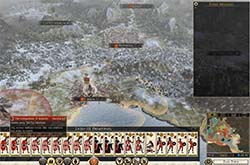
Thanks for the in-depth situation report, CA!
^[sarcasm]^
The Emperor Edition also did not take the opportunity to resolve one of my outstanding issues with the Total War campaigns: the fact that event notifications are not saved and repopulated when loading a saved campaign game. So if you neck-deep in a compelling campaign, but have to stop for a couple days, or weeks, or months, you'll load up the game and not have any idea what had just transpired.
Often times, when I'm in the situation of reloading a campaign that I haven't played for a while, I end up having to play through a handful of turns in order to re-orient myself and figure out what was going on. Then I reload from the save again once I remember what I was trying to accomplish prior to saving the game. This really shouldn't be necessary though, and I don't know why Creative Assembly can't implement this simple, but incredibly important fix.
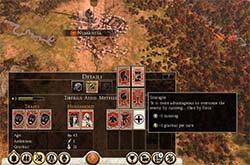
The full skill tree is hidden from the player.
Another annoying useability issue that wasn't addressed is that the player also can't see the full skill trees for characters and armies. When a character or army gains a level and earns a new skill, you can only see the few immediately-available skills and can't see what skills are unlocked deeper into the tree. This makes it hard to plan ahead. Even the Total War Encyclopedia does not show you the skill tree or even what skills unlock which other skills.
So the Grand Campaign feels like an attempt to simplify the game. Many of the ideas seem good on paper: managing entire provinces from a single panel, limiting the amount of large armies, not having to recruit and maintain city garrisons, spies and agents being more useful as saboteurs, etc. But the rigid enforcement of all these mechanics also sucks a lot of the immersive, organic elements of strategy out of the game. I really wish that Creative Assembly had found a way to encourage these sorts of positive simplifications where they make sense, without having to put in so many arbitrary restrictions or cutting down on the flexibility of the player to create and adapt your own strategies.
Politics and civil war
To be honest, I'm still trying to make sense of the politics and civil war systems in this game. The Grand Campaign is so long, that it's very hard to play and practice with these mechanics because it takes forever to get to a point where they become relevant. The game also doesn't do a particularly good job of explaining what all the different political attributes do. I never really understood what, exactly, I was supposed to be doing with my different generals and characters, or what situations required assassinations or diplomatic marriages.
When I reached 50% control of the senate, there was a warning of the threat of civil war, but I didn't pay much attention to it because the game kept telling me that it was low threat. Then, suddenly, a civil war started two turns later. Half my territories and armies were suddenly under the control of enemy loyalists. So much for "low threat". I had to reload a couple times and play around with the senate and politics to find a way to stop it from happening, and through some adoptions and marriages, I was eventually successful at stalling it.
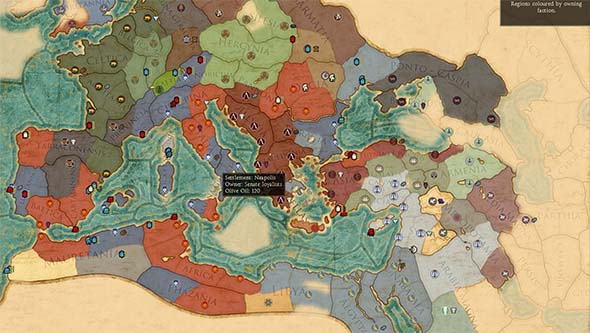
Not understanding how the faction politics worked lead to a premature civil war in my first campaign.
I think the point of the civil war (besides being a part of Rome's actual history) is to add more intrigue and challenge to the later stages of the campaign. This has been a problem with Total War campaigns in the past. If you become powerful enough that you're close to being able to run away with the game, then actually achieving a win state can be an exercise in tedium. The civil war forces your own empire to fragment (hopefully at a time when external threats are all but eliminated), and you'll have to fight once again to piece it back together.
It would be a better system if it just weren't so confusing and poorly explained. Many of the factors of the civil war seem counter-intuitive. Adopting other families' generals and arranging marriages somehow lowers your influence in the senate, thus reducing the chance of a civil war. I would think that bringing more powerful generals under the influence of your family would make you more threatening to the senate and to the remaining families...
The characters themselves aren't very interesting, and there isn't that much motivation to keep them alive. If a general dies, you just recruit a new one. Sure, it takes a long time to accumulate experience with the new general, but there are always replacements. Compare this to Shogun 2, in which your generals were all family members. If one died, and you didn't have any other sons old enough to take over, you had to go for a while without a general in charge of some of your armies. I'm not saying that the game needs a family tree, but the generals at least need to less disposable and harder to replace.
Imperator Augustus is the campaign to play
But Emperor Edition also makes it so that the Grand Campaign isn't the only way to play anymore. There is now a free "Imperator Augustus" campaign that is automatically added to the game when upgraded to the Emperor Edition. This campaign is a pseudo-sequel to the Grand Campaign that takes place during the power struggle between Octavian (Augustus Caesar), Mark Antony, Lepidus, and Pompey following the death of Julius Caesar. Each leader has control of a different sphere of former Roman control and must try to re-conquer the empire under their own leadership.
The Imperator Augustus campaign starts with four competing Roman factions in virtual parity with one another.
Each of the four factions start out in a state of fragile non-aggression (a sort of "Cold War" phase) in which everyone is building up their forces and resources in preparation for making a play on another faction's holdings. The fact that the various Roman factions starts out in such parity with one another makes the early stage of this campaign very compelling as tension gradually builds before exploding into all-out four-way conflict.
In addition, virtually all of the non-Roman factions seem willing to accept treaties with multiple Roman factions, which means that any actions against those weaker, non-Roman foes has indirect effects on their Roman trade partners. There's a real sense of a balancing act here, as you try to avoid tipping the scales of diplomacy so far that it leads to war with another Roman faction, while still trying to develop alliances, recruit troops, acquire technology, and consolidate your holdings. Unfortunately, the A.I.s seem a bit too willing to ignite the powder keg too early, so this tension doesn't get enough time to build to a proper climax before it bursts.
And best of all, this campaign occupies a much shorter period of time, so each turn in the campaign represents a single season rather than a whole year. This multiplies the longevity and usefulness of characters, taking away the pressure to use them as quickly as possible. You can enjoy the build-up of tension without worrying about Octavian or Antony dying of old age before anything actually happens. It's annoying that character still seem to earn traits (particularly negative ones) as quickly as they do in the Grand Campaign. All that standing around that you do in the beginning while waiting for the powder keg to explode invariably results in all your generals developing negative traits for being too "lazy".
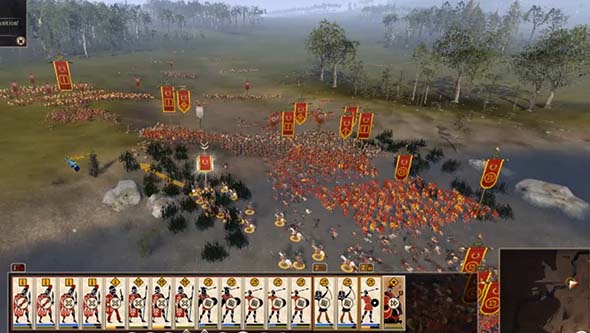
Slower turn pacing pulls more battles out of cities and makes terrain relevant to your tactics.
The movement of units has also been reduced considerably, which makes the map feel much bigger than it actually is. It also helps slightly to pull some battles out of cities, since you don't always have the movement speed to get from one city to another in a single turn. Having more battles in the open field also makes terrain (such as rivers, forests, and narrow mountain passes) much more relevant, since it's easier to see an enemy army approaching and set up a defensive positions or ambush. Spies and other agents are a bit annoying though, since their movement feels very limited. But this is a small price to pay for the overall better quality and scale of the campaign.
I could see Imperator Augustus being a great multiplayer campaign! If only I had more friends who are into Total War...
Hannibal and Caesar DLC are better-paced, but limited
There's also a couple of DLC campaigns that you can pay for. Both are smaller-scale historical scenarios about key moments in the history of the Roman Republic. The first covers Hannibal Barca's doomed invasion against Rome (in which he crossed the Alps with an army of elephants), and the second involves Julius Caesar's conquests in Gaul leading up to his assumption of dictator of Rome.
These campaigns are even more granular than Imperator Augustus. Hannibal's turns represent a single month, and turns in Caesar's campaign represent a couple weeks. The maps for these campaigns are also shrunk, with Hannibal's map covering only the western Mediterranean (Spain, France, Italy, and Northern Africa), and Caesar's map only including territories in Gaul.
The Hannibal [LEFT] and Caesar [RIGHT] campaigns are more granular than the Grand Campaign.
Individual characters play a much greater role in these campaigns as well, and these characters stick around for the whole campaign unless they die in combat (if they are allowed to die, that is).
[CAESAR IN GAUL - this one seems like it will be really easy.]
Finally out of beta
At the very least, Emperor Edition feels like a game that is finally out of beta. Many of the nagging bugs, glitches, balance and technical issues have been resolved or overcome. The A.I. is now competent on land, sea, and siege, so the tactical battles now play up to the standard that you should expect from a Total War game. The problems that are left are the annoying things that can't be fixed because they are fundamental elements of the game's core design.
The Grand Campaign is just too big for its own good. It lacks the subtleties and complexities that earlier games have had. It's playable, and there's plenty of enjoyment for fans of strategy and history to have. It just feels too much like an abridged Cliff Notes rendition of history, rather than a true re-living of it. The Augustus campaign is solid, however (and the DLC ones if you have them), and does make up for the lackluster Grand Campaign to a degree.